An homage to MSN Messenger, and simpler times
A simpler messaging landscape.
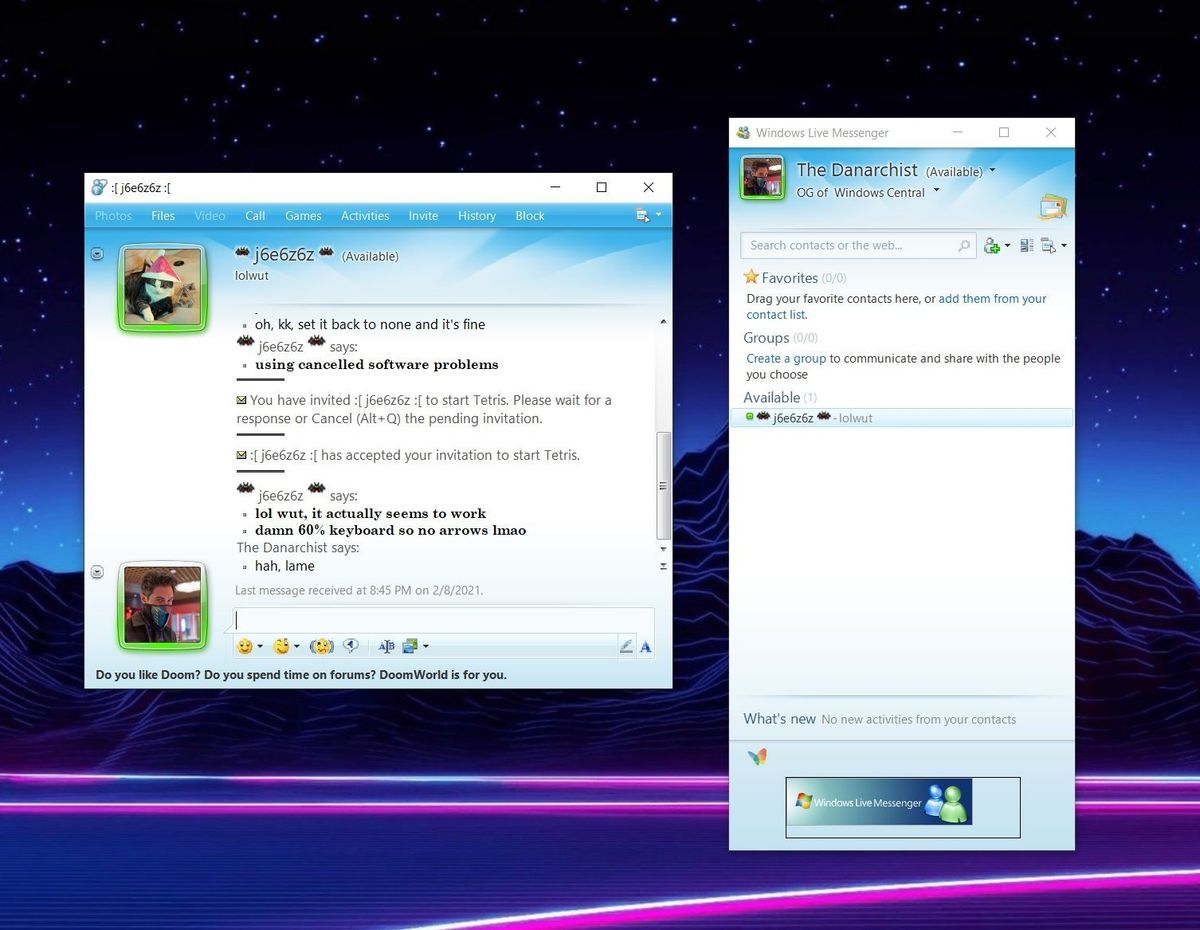
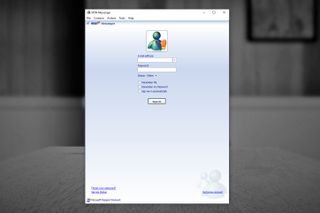
Put down your Tiktoks and Snapchats, and pull up a chair young whippersnappers. I'm going to tell you about a golden age of internet connectivity, before the era of fake news, 24/7 social media addiction, and clout chasing. An era of simplicity and innocence, where many youngsters in the 90s would turn their gaze to an inter-connected future, and see hope, rather than doom.
For many, this late 90s early 00s era of internet communication was dominated by a single platform, known as MSN Messenger, and later Windows Live Messenger. This simple, but intuitive messaging platform served 300 million users per month at its peak, only to eventually be cannibalized in Microsoft's big Skype acquisition, and summarily die alongside Microsoft's other consumer-oriented messaging efforts. Given how social media has evolved, maybe that's a good thing for Microsoft, but that's a whole other story.
Here's a short tribute to MSN Messenger, oft-known as simply "MSN" by users, in memoriam of the young internet.
What was MSN Messenger?
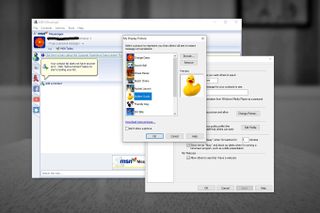
MSN Messenger was among the first major popular text-based chat services, connecting PCs across the world. Although I'm sure it wasn't the first, for me and others around my age group, it was probably the first many of us had used.
Using a Hotmail account, and later a Microsoft account, you could add friends and open chat windows with them, in much the same way most messaging apps work today, complete with group chats. It was also the first service I had used that incorporated webcam-to-webcam video calls, voice clips, emojis (called emoticons back then), and much more.
There were plenty of competing services, including Yahoo! Messenger and AOL Messenger, but at least in the UK, among my peers, it was always MSN Messenger that proved the most popular and used. On Windows PCs, it simply felt more polished, more feature-rich, and more user-friendly than many of its contemporaries.
MSN was fun
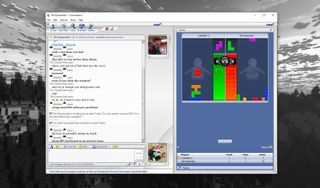
MSN evolved in various ways over time. I recall everyone being mad every time they changed the layout, similar to how people freak out whenever Facebook changes its layout nowadays. You could set your own fonts, which is something most messaging services don't offer now. Windows Live Messenger even had a drawing tool, for sending doodles to your friends right from the chatbox. One of the most notorious features was the "Nudge," which was sort of like a super notification, that caused the chat window to very annoyingly vibrate. Microsoft added the ability to turn this off, thankfully.
Get the Windows Central Newsletter
All the latest news, reviews, and guides for Windows and Xbox diehards.
You could add animated emojis to your screen name. You could add custom emojis, similar to Discord, complete with custom shortcuts. Later versions of MSN came baked with MSN Game Zone in it, letting you play games directly within the chat window.
MSN Messenger even had the rudimentary features of a Facebook-style web-based social media platform, called MSN Profiles. These profiles were effectively like Facebook's own pages, where you could list your interests, some pictures of yourself, among other stuff. Some people went to great lengths to detail these out.
The only missing link was an active feed of updates, and I suppose monetization. MSN was supported by ads, but they weren't the laser-targeted data-harvesting type ads we get today. Your "likes" on MSN's profiles weren't used to target you with ads, and were simply a list of things you actually enjoyed. Perhaps Microsoft just wasn't evil enough to make the same leaps that led us to the hellscape that is modern social media. Who knows.
It was all such a very different world. People didn't really have personal cell phones back then, and there was less of an emphasis on privacy and encryption like there is today. You didn't ask for people's phone numbers, you asked for their "MSN." There were no algorithmic feeds shaping the content you saw. There were no echo chambers crammed with false information being broadcast algorithmically by an unfeeling A.I. whose only goal is to harvest money from advertisers.
Given all the danger that lurks online nowadays, it's hard to imagine how carefree we were about the whole thing back then. But that's what the world feels like when you're a teenager. Or at least, what it did feel like. I suspect things are quite different for kids in 2021.
Microsoft's messaging legacy
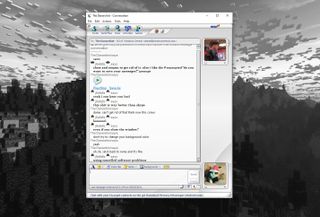
MSN and Windows Live Messenger do live on as a project by the Escargot team, providing custom chat servers and a modded version of the classic client. According to the site, it even has a few hundred users active right now, and is also how I managed to grab some screenshots for this article.
It's kind of wild to think that, at its peak, MSN boasted 300 million monthly active users, which is apparently similar to what Skype is currently serving today. There's a whole other discussion to be made about whether Skype was a worthwhile purchase for Microsoft, given that they already had a huge messaging service of its own. Sure, Skype now powers the back end experiences for various services, like Microsoft Teams and Xbox Live, both of which are very popular. But Skype itself has fallen out of the spotlight as a consumer option for messaging, owing to its lack of privacy features and sluggish apps. I suspect nobody will feel the same nostalgia for Skype that many of us do for MSN Messenger, and likely will for current apps like Discord. That all sums up the modern "business-oriented" Microsoft of today, in any case. There's still an eagerness for alternatives, though, especially if you look at the recent WhatsApp exodus.
It's funny that using the Escargot version of MSN somehow feels like a more pleasant experience than using modern-day Skype, despite the lack of modern features. And it's not just nostalgia. Perhaps there's some wisdom that can be gleaned from looking to the past, if Microsoft is even intent on continuing with its consumer-oriented offerings in the space. The way they've handled Skype makes me think that they aren't all that interested.
Still, it's fun to remember the good old days. Although, I do not miss having to say goodbye to everyone I was chatting to so someone in the house could make a phone call. 90s kids remember.
Messaging apps are everywhere. Get more out of yours with these thoughts, tips, and guides.
- Telegram on PC
- Microsoft's Skype snafu
- Instagram's bigger than you think
- Microsoft's messaging failures and successes
- Do Slack and Teams count as "messaging"?
- RCS vs. SMS vs. iMessage
- Google's messaging failures
- How to switch your family to a new service
- Guilded is the Discord alternative you didn't know you needed
- Telegram vs. Signal vs. WhatsApp

Jez Corden is the Executive Editor at Windows Central, focusing primarily on all things Xbox and gaming. Jez is known for breaking exclusive news and analysis as relates to the Microsoft ecosystem while being powered by tea. Follow on Twitter (X) and Threads, and listen to his XB2 Podcast, all about, you guessed it, Xbox!